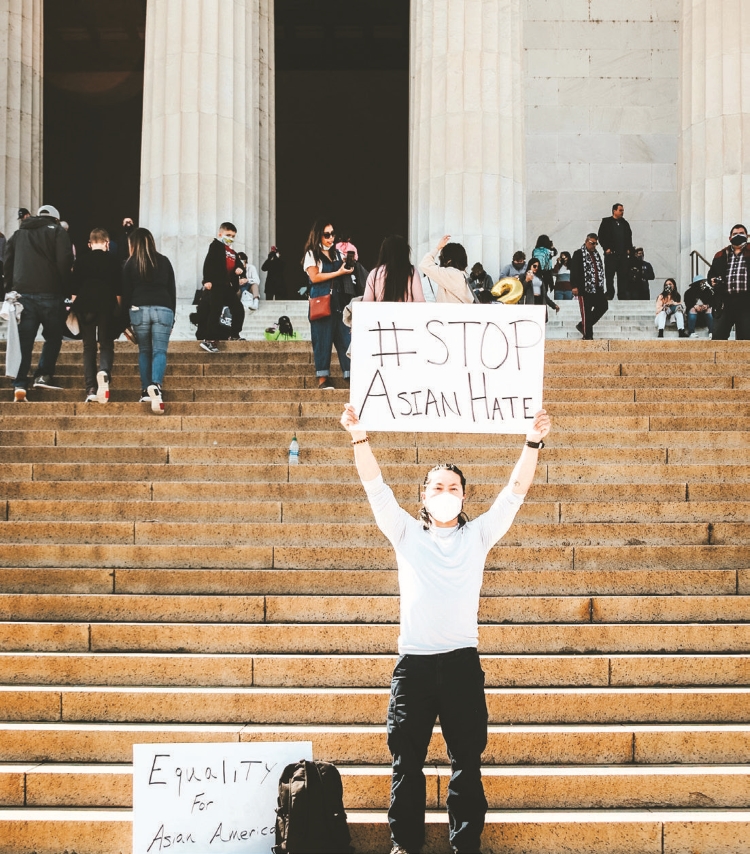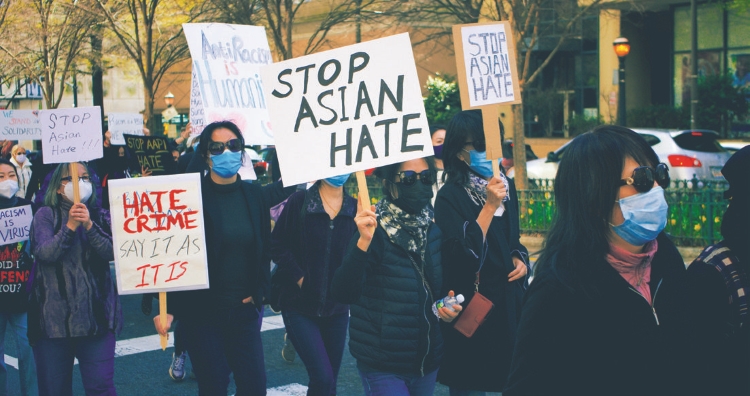
On March 16, a series of shootings occured at three Asian run spas and massage parlors in Atlanta, Georgia, United States. At around 5 p.m. local time, four people were killed and one injured in Young's Asian Massage in Cherokee County near Atlanta, followed by three people at Gold Spa and one at Aromatherapy, according to investigators. Police arrested Robert Allen Long (21) as a suspect at around 8:30 p.m. on the same day. Six of the eight victims were Asian women, raising concerns that the incident may be a hate crime against Asians. In response, Robert Allen Long reportedly denied racial motivation tor the crime during the police investigation and said it was because he was addicted to sex. His remarks angered many Asians. The incident has set off a movement across the United States and social media to stop anti-Asian hate.

The History of AAPI Hate
This is not the first racist incident against Asian Americans and Pacific Islanders (AAPI) in the U.S. In the 1920s and 30s, many northern Filipino workers, called manongs, immigrated to the U.S. to make money. They moved to the U.S. with a big dream, but what they faced was racism. About 1 million manongs worked in large fields and orchards from Washington state to Arizona for low wages under tough working conditions. During the Great Depression in the U.S. in the 1930s, manongs and other immigrant laborers became scapegoats for the economic situation and were targeted for racist attacks. In 1930, mobs assaulted dozens of manongs in Watsonville, California, one of whom was shot to death. Mobs also killed them by blowing up their residences.
Discrimination against manongs did not stop there. In 1933, the US legally banned marriages between Filipino people and white people, and in 1934, Congress limited the number of Filipino immigrants to 50 a year. Since then, manongs have established the Agricultural Workers Organizing Commuttee (AWOC), a successful union to improve wages and working conditions, and have staged strikes or crvic movements to get their rights. Their strike lasted five years, and as a result, the United Farm Workers (UFW) negotiated with grape growers in 1970, improving the lives of more than 10 000 workers. The courage and efforts of the manongs have led to positive changes in immigration policy and protected workers' rights. Some of the monuments that remain now help them tell their stories to their descendants.
Moreover, in the 1940s, when Japan attacked Pearl Harbor and the U.S. participated in World War I, the US government forced all the Japanese immigrants into internment camps on suspicion that they might help the enemy. The camps' environment was very poor. And there were no spies among the detainees. In 1988, Ronald Reagan, then-President of the U.S., apologized to the survivors and paid them $20,000 each. Also, around 1975, when the Vietnam War ended, the U.S. settled many Vietnamese fleeing communism in the U.S. Many Vietnamese immigrants worked in shrimping under poor conditions in Texas. However, the Ku Klux Klan, a group of white supremacist terrorists in America, set fire to Vietnamese boats.
AAPI Hate Crimes During the Pandemic
In a lecture hosted by Monmouth University on March 31, 2021, Sohyun An, professor of social studies education at Kennesaw State Universityn said that Asians were blamed for the epidemic and thus were subjected to discrimination and hatred that went back to the smallpox situation in 1876. At that time, American society pointed to Chinese immigrants as the cause of the smallpox outbreak. Therefore, Chinese immigrants were perceived as a filthy, dirty race that caused incurable diseases and spread them to white people. Many Americans demanded that Chinese immigrants be prevented from entering the U.S., and eventually the U.S. Federal Congress passed the Chinese Exclusion Act in 1882, which banned Chinese immigration. This law was not repealed until 1943.
Furthermore, when the bubonic plague spread around the world in 1899, Chinese people were also blamed for the epidemic. As the bubonic plague spread in Hawaii, the government identified Chinatown as the epicenter and incinerated the buildings where infection occurred. In the process, the flames spread so much that the fire lasted 17 days. The fire consumed many buildings, causing Chinatown to collapse. The result was more than 4,000 homeless people, many of whom were Chinese Americans The Hawauan government sent Chinese Japanese and native Hawauan residents suspected of infection to disinfection sites where officials disinfected men and women of all ages naked. Responding to this fact, Professor An said, "It happened because they did not respect them as equal human beings."
As COVID-19 spread around the world, hate crimes against Asians grew worse. Former US President Donald Trump went on to call the coronavirus the Chinese virus, and Kung Flu experts predicted these terms would lead to hate crimes against Asians.
Many Asian immigrants in the U.S. who have experienced such hate crimes are trying to tell the world about their experiences. They participate in interviews with various media outlets or appeal to their contacts on social networks. They want these crimes to stop, and they do not want future immigrants to suffer similarly. On March 30, at a Korean American supermarket in Charlotte, North Carolina, a 20-year-old American man went on a rampage, destroying refrigerators and shelves as well as swearing, "Go back to your country, you bloody Chinese." The same day on the New York subway, an American in his 50s spat on Asian women and children, making disparaging remarks against Asians. Violence against Asians in the middle of the road has been common. Denny Kim, a 27-year-old Korean American and U.S. Air Force veteran, suffered an unprovoked attack last February by two men while walking down the street in Los Angeles. They called him "Chinese virus" and "Chink," and they said to him, "I want to kill you." The situation continued to escalate with the two men assaulting Kim on the road.
The Opinions of Professionals
On April 16, Georgetown University's Asian Studies Program held a debate about discrimination and violence against Asians during the COVID-19 pandemic. Participants aimed to increase public awareness of Asian American history and their stories and to find practical solutions to address racism towards AAPI. Beth Lew-Williams, a professor of the Department of History at Princeton University, said that the recent rise of anti-Asian discrimination and negative incidences could be connected to historical context. "The violence we're seeing today is closely linked to Asian Americans being viewed as perpetual outsiders," she said.
According to a study Karthick Ramakrishnan, a professor of public and political science at the University of California Riverside, conducted with SurveyMonkey last month, person in eight AAPI said they had experienced more than one incident related to discrimination or hatred. "If you do the math, there are upwards of 2 million Asian Americans who have experienced this," he said. He argued that many people should recognize such problems and find ways to solve them in a better way.
Racism in Korea
Korea is not free from racism either. According to a survey by the National Human Rights Commission of Korea 68.4 percent of immigrants to Korea said "racism exists in Korea." The reasons for racism related to "not being good at Korean (62.3%)" and "not being Korean (59.7%)" were higher than those for "different races (44.7%)" or "different skin colors (24.3%)." In addition to experiencing racism at work, 28 percent of respondents said they experienced racism from strangers on the streets and on public transportation.
In March, an Indonesian woman, YouTuber Indah Asmigianti, complained of racism from three Korean men on OmeTV, a site that facilitates video chats with random, anonymous people. One of them looked at her face on the screen and covered the screen with his hand, saying, "Oh, your face is so horrible I can't see it." When Indah said she would upload the video to YouTube for everyone to see in the recording, the man replied, "I don't care, you know, I still think that Koreans are above Indonesians." After Indah uploaded the video, angry Indonesian netizens posted critical comments to their Instagram pages. Regarding this, one of the men wrote on his Instagram story, "I know I'm guilty, but this has nothing to do with my skin color or my country. Once again, I'm sorry. Please don't attack me. This really bothers me."
Even within our university, Asian students from other countries suffer racism. Uyanga is a Mongolian student in the Department of Public Administration at SeoulTech. In an interview held on April 26, she replied that she had suffered a lot of racism while living in Korea for about five years. She said that the racism she felt in Korea mainly occurred in the subway. Usually Koreans who are over 40 stare when she is using her native language, Mongolian, on the subway. "When I talked with my Mongolian friends in my native language on the subway, they stared at us. I don't know if it was because I was a foreigner or if they were curious about where I came from, but it was really unpleasant," she said. Additionally, she had an experience a few years ago in the subway when a man in his 40s next to her ranted, "You smell bad." She felt so uncomfortable with the man that she got off at the next station and waited for the next train to arrive, a big inconvenience. Therefore, these days she uses Korean when she needs to talk on the subway or watches Korean TV programs on her cell phone intentionally to avoid being caught as a foreigner.
She also experienced racism on campus. Currently, our school student dormitory consists of five buildings, including Buram dormitory, KB dormitory, and Sunglim dormitory. Surim dormitory and Nuri dormitory Among them are international students only can use Sunglim dormitory. As a resident of Sunglim dormitory, Uyanga claimed that this could be seen as an act of discrimination against international students in that they do not have a choice.
From these discrimination experiences, Uyanga had developed the hope that Koreans would not look at people from other countries in a bad way. When men 40 years old or older stare at her, she says that she feels fear. "I'm Asian and my appearance is similar to Koreans, so there are some people who think I'm Korean if I don't talk. However, people who have a different appearance from Koreans may have experienced more racism than I did," she said, expressing sympathy for the difficulties other international students have had.

Respect for everyone
Like this, Asians often have not received equal treatment from the past to the present. These experiences remain traumatic for many Asians and can lead to an identity crisis. Asians' pleas for help have been ignored as if they were happening in another world. Eric Nam, a Korean-American singer-songwriter, said, "We must all continue to be active in creating the change that we so badly want and need for ourselves and our future generations."
According to Article 1 of the Universal Declaration of Human Rights, "all human beings are born free and equal in dignity and rights." Furthermore, Article 2 continues that "everyone is entitled to all the rights and freedoms set forth in this Declaration without distinction of any kind, such as race, color, sex, language, religion, political or other opinion, national or social origin, property, birth, or other status." In conclusion, as humans, we should live with respect for each other, taking note of these articles.
Reporter,
Jaeyoung Kim jaeyoung@seoultech.ac.kr
Source: Unsplash, Freepik


 Comment 0
Comment 0 Posts containing profanity or personal attacks will be deleted
Posts containing profanity or personal attacks will be deleted